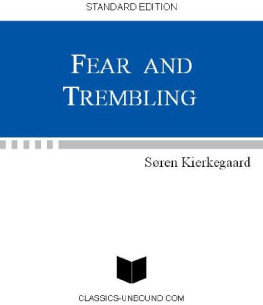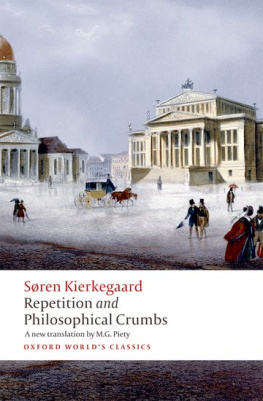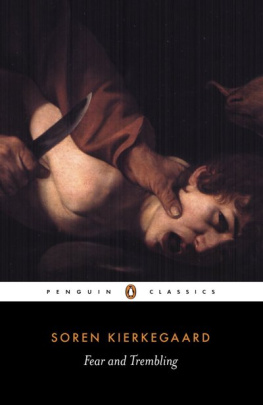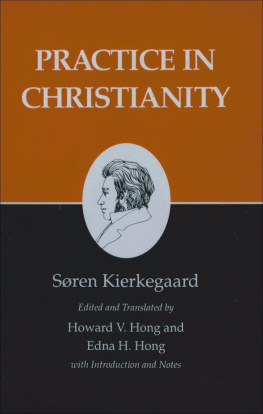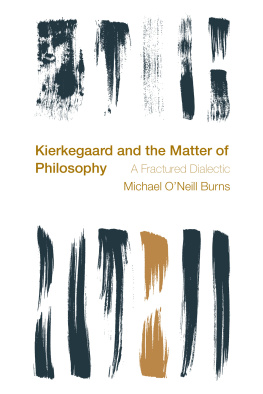Soren Kierkegaard - Either Or, Part II
Here you can read online Soren Kierkegaard - Either Or, Part II full text of the book (entire story) in english for free. Download pdf and epub, get meaning, cover and reviews about this ebook. year: 1987, publisher: Princeton University Press, genre: Religion. Description of the work, (preface) as well as reviews are available. Best literature library LitArk.com created for fans of good reading and offers a wide selection of genres:
Romance novel
Science fiction
Adventure
Detective
Science
History
Home and family
Prose
Art
Politics
Computer
Non-fiction
Religion
Business
Children
Humor
Choose a favorite category and find really read worthwhile books. Enjoy immersion in the world of imagination, feel the emotions of the characters or learn something new for yourself, make an fascinating discovery.

- Book:Either Or, Part II
- Author:
- Publisher:Princeton University Press
- Genre:
- Year:1987
- Rating:4 / 5
- Favourites:Add to favourites
- Your mark:
- 80
- 1
- 2
- 3
- 4
- 5
Either Or, Part II: summary, description and annotation
We offer to read an annotation, description, summary or preface (depends on what the author of the book "Either Or, Part II" wrote himself). If you haven't found the necessary information about the book — write in the comments, we will try to find it.
Either Or, Part II — read online for free the complete book (whole text) full work
Below is the text of the book, divided by pages. System saving the place of the last page read, allows you to conveniently read the book "Either Or, Part II" online for free, without having to search again every time where you left off. Put a bookmark, and you can go to the page where you finished reading at any time.
Font size:
Interval:
Bookmark:
EITHER/OR
PART II
KIERKEGAARDS WRITINGS, IV

PART II
by Sren Kierkegaard
Edited and Translated
with Introduction and Notes by
Howard V. Hong and
Edna H. Hong
PRINCETON UNIVERSITY PRESS
PRINCETON, NEW JERSEY
Copyright 1987 by Howard V Hong
Published by Princeton University Press
41 William Street, Princeton, New Jersey
In the United Kingdom Princeton University Press, Guildford, Surrey
All Rights Reserved
Library of Congress Cataloging in Publication Data will be
found on the last printed page of this book
ISBN 0-691-07316-3 (cloth)
ISBN 0-691-02042-6 (pbk )
Preparation of this volume has been made possible in part by a grant from the Division of Research Programs of the National Endowment for the Humanities, an independent federal agency
Clothbound editions of Princeton University Press books are printed on acid-free paper, and binding materials are chosen for strength and durability Paperbacks, though satisfactory for personal collections, are not usually suitable for library rebinding
Designed by Frank Mahood
Printed in the United States of America by Princeton
University Press, Princeton, New Jersey
A FRAGMENT OF LIFE
edited by
Victor Eremita
PART II
CONTAINING THE PAPERS OF B,
LETTERS TO A
Les grandes passions sont solitaires, et les transporter
au dsert, cest les rendre leur empire
[The great passions are hermits, and to transport
them to the desert is to hand over to
them their proper domain].
CHATEAUBRIAND
My Friend, [II 5]
The lines on which your eye falls first were written last. My intention with them is to attempt once again to compress into the form of a letter the extended exploration that is hereby transmitted to you. These lines correspond to the last lines and together form an envelope, and thus in an external way they evince what the internal evidence will in many ways convince you ofthat it is a letter you are reading. This thoughtthat it was a letter I wrote to youI have been unwilling to give up, partly because my time has not permitted the more painstaking elaboration that a treatise requires, and partly because I am reluctant to miss the opportunity of addressing you in the more admonishing and urgent tone appropriate to the epistolary form. You are all too skilled in the art of talking in generalities about everything without letting yourself be personally involved for me to tempt you by setting your dialectical powers in motion. You know how the prophet Nathan dealt with King David when he presumed to understand the parable the prophet had told him but was unwilling to understand that it applied to him. Then to make sure, Nathan added: You are the man, O King. use any of these scales, not the post office scale, for it comes to you not for forwarding but as a deposit, and not the scale of critical analysis, since I would be loath to see you make yourself guilty of such a gross and uncongenial misunderstanding.
marriage, but you misuse your ironic look and your sarcastic taunting to ridicule it.
In this connection, I concede that you are not shadow-boxing, that you land some solid blows, and that you are keenly observant, but I also want to say that this is perhaps your error. Your life will amount to nothing but tentative efforts at living. You presumably will answer that this is always better than traveling on the train of triviality and atomistically losing oneself in lifes social hordes. and therefore your look has another meaning; but you are satisfied with it. You love the accidental. A smile from a pretty girl in an interesting situation, a stolen glance, that is what you are hunting for, that is a motif for your aimless fantasy. You who always pride yourself on being an observateur must, in return, put up with becoming an object of observation.
I will remind you of an incident. A pretty young girl whom you by chance (this, of course, must be emphasized; you knew neither her social position nor her name, age, etc.) sat beside at table was too cool to bestow a glance upon you. You were momentarily perplexed as to whether this was merely Sprdigkeit [coyness] or whether together with it there was a little embarrassment, which properly illuminated could place her in an interesting situation. She sat directly opposite a mirror in which you could see her. She cast a shy glance in that direction without suspecting that your eyes had already taken quarters there; she blushed when your eyes met hers. You preserve such things as accurately and as swiftly as a daguerreotype, which, as is generally known, takes only a half-minute even in the poorest weather.
Ah, you are a strange fellow, one moment a child, the next [II 8] an old man; one moment you are thinking most earnestly about the most important scholarly problems, how you will devote your life to them, and the next you are a lovesick fool. But you are a long way from marriage, and I hope that your good genius will keep you from taking the wrong path, for at times I seem to see in you traces of wanting to play a little Zeus. You are so superior about your love that I daresay you fancy that every girl would count herself lucky to be your sweetheart for one week. And now you may resume for the time being your amorous studies, along with your esthetic, ethical, metaphysical, cosmopolitan, and other studies. One cannot really become angry with you; evil in you, like the Middle Ages concept of it, has a certain additive of good nature and childishness. As far as marriage is concerned, your relation has always been only that of an observer. There is something treasonable in wanting to be merely an observer. How often you entertained meyes, I readily admit itbut how often you also tormented me with your stories of how you had stolen your way into the confidence of one and then another married man in order to see how deeply bogged down he was in the swamp of marital life. You are really very gifted at slipping in with people; that I will not deny, nor that it is very entertaining to hear you relate the consequences of it and to witness your hilarity every time you are able to peddle a really fresh observation. But, to be honest, your psychological interest is not in earnest and is more a hypochondriacal inquisitiveness.
But now to the subject. There are two things that I must regard as my particular task: to show the esthetic meaning of marriage and to show how the esthetic in it may be retained despite lifes numerous hindrances. In order, however, that you may yield with all the more confidence to the upbuilding that the reading of this little essay can possibly provide you, I always have at the outset a little polemical prologue in which appropriate consideration will be given to your sarcastic observations. But by doing that I also hope to pay appropriate tribute to the pirate cities I assure you that this subject is so much on my mind that I, who ordinarily feel only [II 9] slightly tempted to write books, actually could be tempted to do that if I dared to hope I could save just one single marriage from the hell into which it has perhaps plunged itself or to make a few people more competent to realize the most beautiful task given to a human being.
To be on the safe side, I shall occasionally draw upon my wife and my relation to her, not as if I presumed to represent our marriage as an instance of the norm, but partly because those poetic descriptions seized out of the air usually do not have much convincing power and partly because I consider it is of importance for me to show that it is possible to preserve the esthetic even in everyday life. You have known me for many years; you have known my wife for five. You consider her rather beautiful, exceptionally charming, which I do, too. I know very well, however, that she is not as beautiful in the morning as in the evening, that a certain touch of sadness, almost of ailment, disappears only later in the day, and that it is forgotten by evening when she truly can claim to be appealing. I know very well that her nose is not flawlessly beautiful and that it is too small, but it nevertheless pertly faces the world, and I know that this little nose has provided the occasion for so much teasing that even if it were within my competence I would never wish her one more beautiful. This attaches a much more profound significance to the accidental in life than that which you are so enthusiastic about. I thank God for this good and forget the weak side.
Next pageFont size:
Interval:
Bookmark:
Similar books «Either Or, Part II»
Look at similar books to Either Or, Part II. We have selected literature similar in name and meaning in the hope of providing readers with more options to find new, interesting, not yet read works.
Discussion, reviews of the book Either Or, Part II and just readers' own opinions. Leave your comments, write what you think about the work, its meaning or the main characters. Specify what exactly you liked and what you didn't like, and why you think so.

